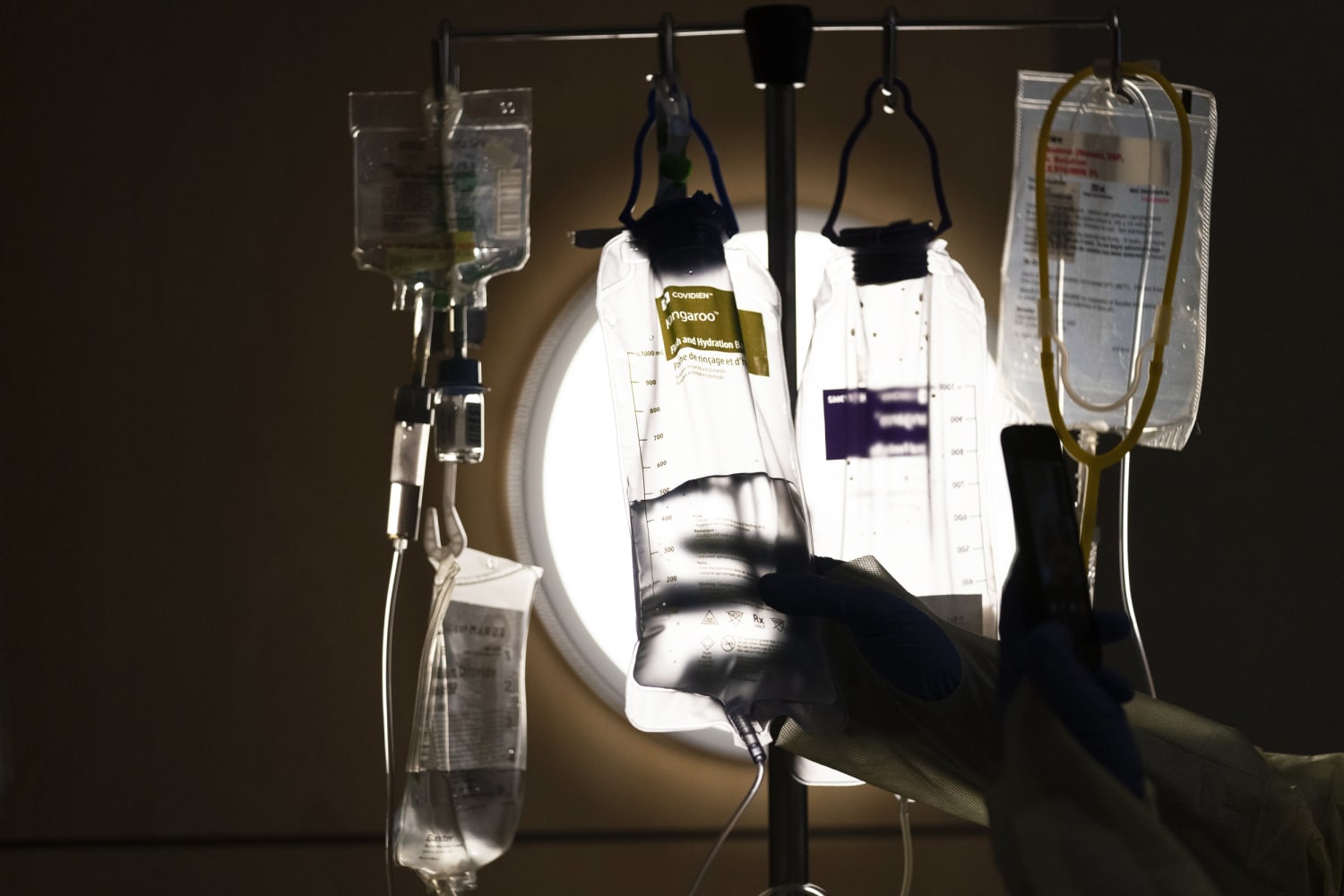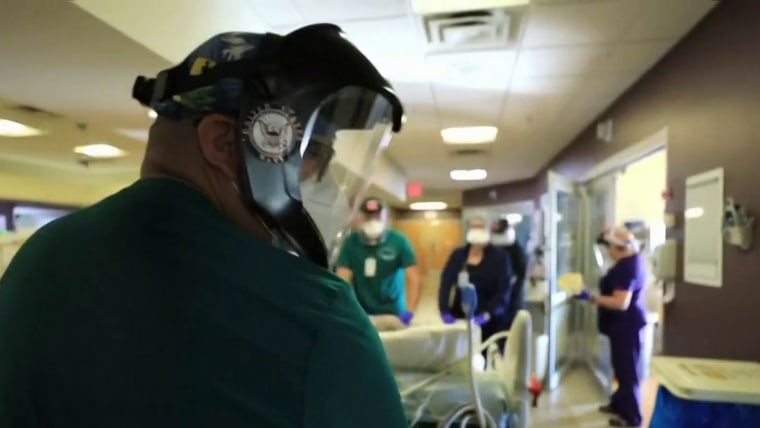After two weeks apart in late September, Sherry Cohen was eager to see her mother, Sandy, who was in quarantine at an assisted living facility at the time.
Cohen, 51, hurried to the center in Washington, D.C., to see Sandy, 82, and was shocked. Her mother’s right eye was swollen shut. A rushed visit to a corneal specialist led them to the emergency room, where they were met by frantic hospital staff members overwhelmed by coronavirus cases.
They waited for eight hours in a hospital overflow tent to finally get antibiotic eyedrops for the corneal infection.
“Here’s this woman who desperately needs care, but everybody around you desperately needs care,” Cohen said.
Three weeks later, Sandy completely lost her vision, having already lost sight in her left eye to glaucoma, and Cohen said she believes the culprit is clear. A hospital system overwhelmed by coronavirus led to delayed care and a dire consequence.
It’s a trend that could extend into the new year as hospitals across the country battle with a new variant that is particularly dangerous among unvaccinated people.
“It’s never going to go away if we don’t stop pretending,” Cohen said over the phone Wednesday.
Beleaguered hospitals and medical workers are trying to share the same warning: The prolonged lack of access to medical care because of Covid surges is having an outsize effect on patient care. Now, despite a brief respite, it appears hospitals in communities nationwide are in triage as the latest coronavirus variant spreads.
While the omicron variant is more transmissible than previous strains, delays in care due to the coronavirus aren’t new. People nationwide have had to push back much-needed procedures, operations and treatments for nearly two years amid the public health emergency. Even in months when case numbers were low, many people struggled to find appointments and consultations.
Still, hospitals were beginning to return to patient levels seen in 2019, according to a survey in October of 100 U.S. hospitals by the strategic consulting firm McKinsey & Co. The numbers brought renewed optimism to medical facilities and patients hoping to get long-delayed treatments and procedures.
Gretchen Berlin, a senior partner at McKinsey who is a registered nurse, said the analysis found that the country would have been dealing with surgical backlogs well into 2022 if the case count had remained as it was before the omicron variant arrived.
She said that didn’t account for delayed screenings, biopsies and other preventive health measures that could lead to bad medical outcomes for people, nor did it consider how the postponements have affected the quality of care.
“We don’t actually understand yet as a system the quality implications of what is happening in all of this,” Berlin said. “I think we probably won’t feel the full effect of that for several years.”
For many patients and doctors, the delays are testing the boundaries of what is considered “elective surgery” — scheduled procedures that may be vital but aren’t deemed to be immediate emergencies.
The situation is also making it more difficult to navigate a medical system that has long been overwhelmed.
Clarissa Silva, 48, of Birmingham, Alabama, who suffers from uterine fibroids, hopes to find some availability among hospitals and providers in her area.
The fibroids are pushing against her colon, causing severe pain, a distended stomach and a herniated belly button. She came away from a emergency room visit in November with a doctor’s recommendation for a hysterectomy. He warned that if they were left untreated, the fibroids would continue to grow.
“It was so painful, even after they gave me morphine,” Silva said. “I walked out and still had this thing in my belly button, and they said, ‘You have to have surgery.’”
That started Silva’s monthlong search for a consultation in Birmingham and nearby cities, but she has yet to receive a response.
The omicron variant has renewed the stress on U.S. hospital systems that have struggled since March 2020 with shortages of staff members, operating room capacity, beds and personal protective equipment.
The omicron variant appears to be further limiting operations and other procedures, particularly in hospitals where less than 30 percent of the beds are available in intensive care units, the American College of Surgeons said.
While a clear analysis of the omicron variant’s effects wasn’t yet available, the association said hospitals and states were already taking decisive action as they anticipated that the current wave could run for a few more weeks or months.
Massachusetts, for example, put out new guidance Tuesday to limit “non-essential, non-urgent scheduled procedures” as its hospitals struggled to clear beds and address the latest wave of coronavirus patients.
Some are worried that the lack of beds and the churn of Covid patients could lead to missed medical conditions or even hospital mishaps.
Judy Starkey, 87, said she started to feel back pain in October but ignored it initially. She got her booster shot, went to the grocery store and took a walk around her home in Wayzata, Minnesota, but the pain continued to grow worse, and the next morning her daughter Sarah, 58, found her screaming in pain and unable to move.
“It felt like I was in childbirth,” Judy Starkey said. “But without a baby at the end.”
A visit to the emergency room at a hospital inundated by Covid cases led to a prescription for painkillers. But the emergency room physician missed a fracture in Starkey’s back, which went untreated for nearly two weeks until her general practitioner was able to find her a hospital bed and treatment for her back.
Sarah Starkey said, “My feeling is that, under normal circumstances, if they hadn’t been so stressed, they would have maybe spent some more time with her.”
While the saga may be over for their family, the Starkeys and other people throughout the U.S. will most likely have to work with hospitals and medical workers consistently at the brink, at least until the latest wave ends.
“We were lucky,” Sarah Starkey said. “There are people in far worse shape with not Covid-related injuries, from car accidents, who are not going to get the best care because of the staffing shortage and unvaccinated people.”
Source: | This article originally belongs to Nbcnews.com











